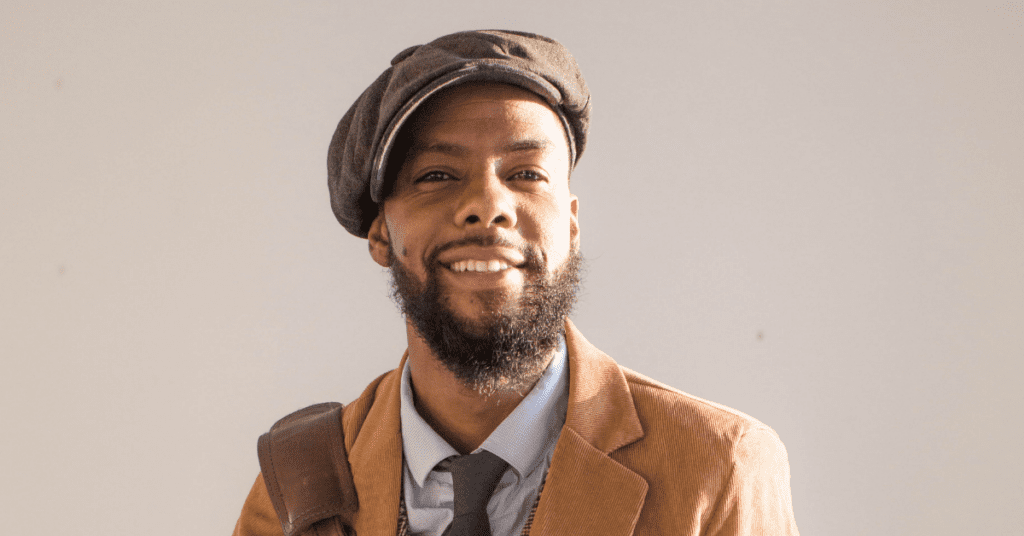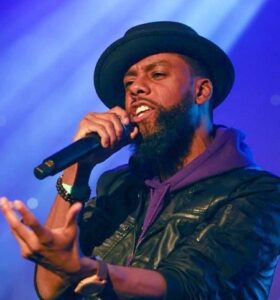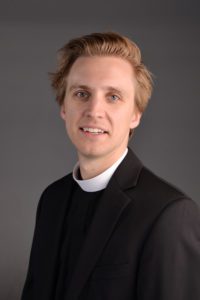Joe Davis is a poet and artist living in North Minneapolis; he creates spaces for people to find healing, find their voice, and find each other. From an early age Joe identified as an artist. He recalled writing poems and comics in elementary school. He also experienced how art created a space for healing. In elementary school he got really sick and although Joe didn’t know it at the time, he now sees that he used his art as his own version of therapy. He would write poems, songs, and stories which gave him a sense of hope, healing, and empowerment. He could use his art to express things that were hard for him to talk about.
It was also during that time, around 3rd or 4th grade, that a few teachers and mentors encouraged him to share his work with others, so Joe began to share his work at open mic events. Through these events he saw the shared power that art could bring as kids he knew would say things like, “I never knew you went through that.” Art became a mutual space for sharing experience and creating and sharing it became something that he loved doing.
“I’m not writing for a living, I’m writing for my life, because it saved me and created healing space for other people,” Joe says.
When talking about creating space for others, Joe recognizes that even with our best efforts we may never create a space where everyone feels safe enough to share. In light of this, Joe talks about and wants to create “brave space,” a space where people can feel brave enough. The space is safe enough for people to be brave. He also wants his events and experiences to be participatory because, “As created beings we all have creative capacity.” Joe wants to invite others into the act of creation.
Although poetry was his first love, Joe also works in and through other mediums as well. He realized he wanted to tell bigger stories and reach more people. He has been in several bands throughout the years and his current band is called The Poetic Diaspora, which plays a style of music Joe calls Freedom Funk. “Freedom Funk is our generation’s version of the freedom songs. They are cries for justice and peace, but you can dance to it.” Joe also began writing and directing theater productions for which The Poetic Diaspora plays the soundtrack. Joe is always asking himself, “How can I more dynamically engage people to participate in the story of the gospel, healing, and transformation?”
Although he never identified as having pastoral gifts until attending Luther Seminary, Joe now sees his work as pastoral. After Jamar Clark was killed by police in his community, Joe saw how his community was grieving and began an open mic ministry. They offered free food and allowed people to come and say what they needed to say, without being censored. People needed a space to release the pain, rage, and hurt they were experiencing. These events weren’t held in churches because there are people who wouldn’t step foot in a church. Joe said it was a deeply spiritual time and experience even if others wouldn’t be able to identify it as such.
Along with his artistry Joe is also a public speaker, which is another key part of his ministry. He is often asked to speak at schools or with companies about race, diversity, or youth empowerment. Joe is also a qualified administrator of the Intercultural Development Inventory. And although he can’t explicitly share the difference that Jesus makes in these spaces he is able to share stories that are modern day examples of the gospel in action. The South African teaching of “ubuntu” or “I am because you are” rings particularly true. “Whatever space I’m in, my mission is the same. I’m here to talk about healing and liberation. But it’s going to look different in a different context.”
At the pace of relationships
Maybe the biggest lesson Joe has learned so far in his ministry is that all his work moves at the pace of relationships. We all want to see radical and dramatic transformations happen overnight, but he has to remind himself and us that “You can’t plant a seed and eat the fruit the same day. You need to cultivate the soil.” We need to slow down, listen, and care for the bodies around us. This includes caring for our own bodies, which means being present in the moment with ourselves. Joe said that he is learning to see his emotions as teachers. “How can I sit down with them and learn from them instead of running from them?”
Joe has some advice for someone just starting out in an artistic ministry:
- Find your passion and your purpose.
- Practice, practice, practice. You won’t be great at something right away so posture yourself with humility and never stop learning.
- Find a community of mentorship and support. Joe knows that he wouldn’t be where he is today without those key people in his life that fostered his gifts and challenged him to share them with the world.
Prayer
Creative and Creating God, thank you for the artists and those who never stop creating. Thank you for the spaces of mutual healing, wholeness, and empowerment that artists create. Help us all remember that we are co-creators working with the Spirit to bring your Kingdom to earth. Bless Joe, his ministry and the ministry of all artists. Amen.
If you would like to learn more or are interesting in having Joe come speak at your church/school/business you can find his website here: https://joedavispoetry.com
Read some of the posts Joe has written for The Faith+Leader:


